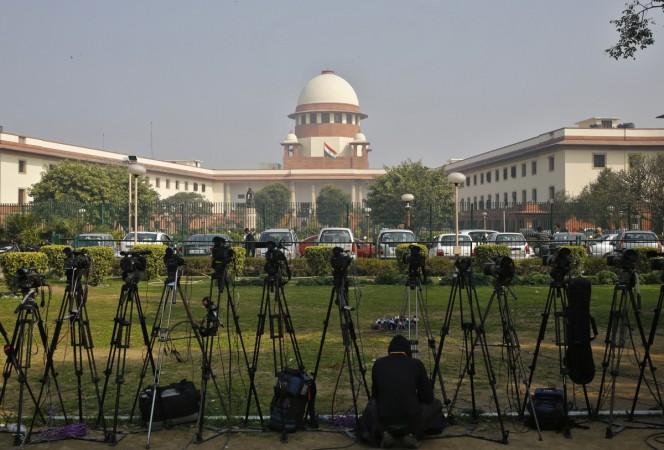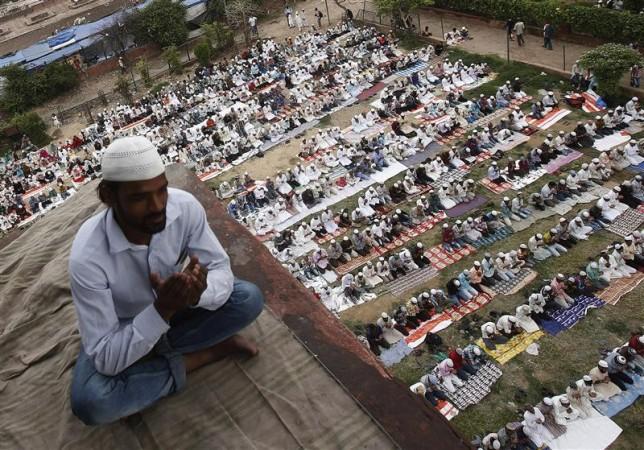
The Supreme Court read out the judgment on a plea that challenged a verdict passed in 1994, which had said that mosques are not integral to Islam and that namaz needn't be performed in a mosque.

Here are the updates:
Are mosques an integral part of Islam?
- The RSS said in a statement that they were happy with the SC's verdict and were confident that a just decision would be reached at the earliest.
Today,the Supreme Court has decided to hold hearing on the Shri Rama Janmabhumi case from 29th Oct '18 by a 3 member bench. We welcome this decision and are confident that a just verdict will be reached over the case at the earliest. https://t.co/md7xp9AcYn
— RSS (@RSSorg) September 27, 2018 - Alok Kumar, VHP Working President said that he is happy with the judgment.
I am satisfied that this impediment has been defeated. The way is now clear for the hearing of Ram janmabhoomi appeals: Alok Kumar, VHP Working President on Ayodhya matter (Ismail Faruqui case) pic.twitter.com/bvAgVYRzNA
— ANI (@ANI) September 27, 2018 - Rajiv Dhawan, Petitioner's counsel in Ayodhya title suit case said, "Majority judgement will please majority,minority judgement will please minority.Very problem we started off with hasn't been resolved.Not about arithmetic,but of convincing everybody that SC should've spoken in one voice," to ANI.
Majority judgement will please majority,minority judgement will please minority.Very problem we started off with hasn't been resolved.Not about arithmetic,but of convincing everybody that SC should've spoken in 1voice: Rajiv Dhawan, Petitioner's counsel in Ayodhya title suit case pic.twitter.com/e94PVmab1K
— ANI (@ANI) September 27, 2018 - The judgment passed regarding the role of mosques in Islam was 2:1. CJI Misra read that the 1994 Ismail Faruqui judgment was not relevant to the present civil suit. Justice Bhushan supported the CJI and said that the context in which the judgment was passed in 1994 will have to be reexamined, according to News18.
Justice Nazeer, the one dissenting the view, said that mosques for namaz and Islam is based on belief and faith and recommended the case to be heard by a larger bench. - Justice Bhushan said, "All religions and religious places need to be equally respected. Ashoka's edicts preach tolerance to faith of others."
Ayodhya land dispute case will not be referred to a larger bench: Justice Bhushan on behalf of him and CJI Dipak Misra #SupremeCourt pic.twitter.com/bAQQlOxfcE
— ANI (@ANI) September 27, 2018Ayodhya matter (Ismail Faruqui case): All religions and religious places need to be equally respected. Ashoka's edicts preach tolerance to faith of others, says Justice Ashok Bhushan
— ANI (@ANI) September 27, 2018 - Justice Nazeer went on to say that the case needs to be referred to a larger bench
Ayodhya matter (Ismail Faruqui case): Larger bench needs to decide what constitutes essential religious practice, says Justice S Nazeer
— ANI (@ANI) September 27, 2018 - Justice Nazeer has penned a dissenting verdict. According to NDTV, he said that the 1994 judgment by Ismail Faruqui was approached without a 'comprehensive examination' and needs to be looked into in detail. He also questioned the inf;luence the Ismail verdict could have had in the 2010 Allahabad High Court judgment.
- Reports have suggested that the three judges' opinions differ.
- Zafaryab Jilani, senior advocate of the Allahabad High Court said, " Hearing will start now. We are ready," according to News18. He added that the ruling is not a setback for them.
- The Ayodhya case will be heard from October 29 along with Land Title dispute case.
- SC states that the 1994 order is not applicable to this case.
- Supreme court rules out the petition to refer the Ayodhya land dispute case to a larger bench.
- Judgment is being read out.
- Justice Nazeer will give a separate verdict.
- Justice Ashok Bhushan will announce the verdict.
- A 2010 verdict by the Allahabad High Court said that the highly disputed land should be divided into three parts between Hindus and Muslims.
- The apex court has declared that it will not hear the case on religious grounds but will treat the case solely as a land ownership dispute.
- Chief Justice Dipak Misra, Justice Ashok Bhushan, Justice S Abdul Nazeer will be hearing the case and passing the judgment.
- Hindu groups say that the Muslim parties filing a plea for a larger bench is to just postpone the main hearing.
- A litigant in the case has proclaimed that the Babri Masjid land belongs to Lord Ram, according to NDTV.
- Muslim groups have said that the 1994 verdict is unfair to them and this judgment caused the communal rift in Ayodhya.
- The Supreme Court will announce the verdict at 2 pm on Thursday
- The judgment will be passed based on the pleas filed by Muslim groups seeking a larger bench to reconsider the 1994 judgment.
- After hearing the case, the court had reserved its verdict on July 20.
- The verdict is regarding a plea challenging a 1994 judgment question the necessity of mosques in Islam. The judgment said that mosques are not necessary and that namaz can be offered anywhere.
- Chief Justice Dipak Misra and Justices Ashok Bhushan and S Abdul Nazeer will constitute the three-judge bench.
Making Adultery Gender Neutral
The Supreme Court has decriminalised 158-year-old Section 497 (Adultery Law) in a judgment passed on Thursday morning. The verdict was passed by a five-member bench which said that adultery is not a crime and a man cannot be held punishable for it. the verdict also mentioned that the woman is not a victim in this case.
Justice Chandrachud who was part of the bench said, "Section 497 destructive of women's dignity, self-respect as it treats women as chattel of the husband."
- Quotes by the five judges
Justice Malhotra, the lone woman judge on the bench, said, "Section 497 is a clear violation of fundamental rights granted in the Constitution and there is no justification for continuation of the provision."
Justice Nariman called Section 497 as an archaic law.
Justice Chandrachud said Section 497 destroys and deprives women of dignity and is destructive of women's dignity, self-respect as it treats women as "chattel of husbands"
The CJI Dipak Misra said adultery dents the individuality of women and it is not a crime in countries like China, Japan, and Australia. Adultery might not be the cause of an unhappy marriage, it could be a result of an unhappy marriage.
The CJI and Justice Khanwilkar said mere adultery cannot be a crime, but if any aggrieved spouse commits suicide because of life partner's adulterous relation, then if evidence is produced, it could be treated as an abetment to suicide.
- "My opinion is that Triple Talaq ordinance should be challenged in Court because it's a fraud. In the first page of the ordinance, the government says that the Supreme Court has termed it unconstitutional but SC didn't say any such thing rather it had just set it aside," Asaduddin Owaisi
My opinion is that Triple Talaq ordinance should be challenged in Court because it's a fraud. In first page of the ordinance,govt says that Supreme Court has termed it unconstitutional but SC didn't say any such thing rather it had just set it aside: Asaduddin Owaisi pic.twitter.com/d5xNY9CAkq
— ANI (@ANI) September 27, 2018 - Asaduddin Owaisi, President of the All India Majlis-e-Ittehadul Muslimeen has challenged the Triple Talaq after the Supreme Court scrapped Section 497.
s377 now s497 decriminalised BUT Triple Talaaq has Penal Provision (criminalise) Kya Insaaf hai MITRO aapka ,what will BJP do https://t.co/opt9VFDFwe
— Asaduddin Owaisi (@asadowaisi) September 27, 2018The Supreme Court didn’t say Triple Talaaq is Unconstitutional but “set it aside “but Apex Court has said 377 & 497 is Unconstitutional will Modi Government learn from these judgments and take back their Unconstitutional Ordinance on Triple Talaaq
— Asaduddin Owaisi (@asadowaisi) September 27, 2018 - Petitioner's lawyer Kaleeswaram Raj talks to the media after the Supreme Court passed the verdict.
#WATCH: Petitioner's lawyer Kaleeswaram Raj explains the Supreme Court's verdict that declared section 497 (Adultery) of the IPC unconstitutional pic.twitter.com/8zYaWMzJcW
— ANI (@ANI) September 27, 2018 - National Commission of Women chief Rekha Sharma said, "I welcome this judgment by Supreme Court. It was an outdated law which should have been removed long back. This is a law from the British era. Although the British had done away with it long back, we were still stuck with it."
I welcome this judgement by Supreme Court. It was an outdated law which should have been removed long back. This is a law from British era. Although the British had done away with it long back, we were still stuck with it: Rekha Sharma, NCW chief on SC decriminalising adultery pic.twitter.com/mzXLl74hvQ
— ANI (@ANI) September 27, 2018 - The CJI said, " Adultery might not be the cause of an unhappy marriage, it could be the result of an unhappy marriage."
- The Chief Justice said that adultery can be grounds for a divorce but can not be seen as a crime.
- Five-judge bench decries adultery as a criminal offence.
Five-judge bench of Supreme Court decriminalises adultery in a unanimous judgement pic.twitter.com/EzbAUL3dER
— ANI (@ANI) September 27, 2018 - Section 497 (Adultery Law) is unconstitutional.
- "Any law which affects individual dignity, equity of women in a civilised society invites the wrath of the Constitution," Chief Justice of India Dipak Misra said
- Adultery cannot be a criminal offense.
- The Judges have stated that the adultery law is arbitrary and it treats women as subordinates.
- The law said, "whoever has sexual intercourse with a person who is and whom he knows or has reason to believe to be the wife of another man, without the consent or connivance of that man, such sexual intercourse not amounting to the offense of rape, is guilty of the offence of adultery." It also added that "the woman shall not be punishable as the abettor'"
- The punishment for adultery is up to five years of jail.
- The judgment will be regarding the validity of Section 497 of the Indian Penal Code which criminalises adultery.
- The Supreme Court will pass its judgment on a 150-year-old law which punishes the man in an adulterous relationship.

















